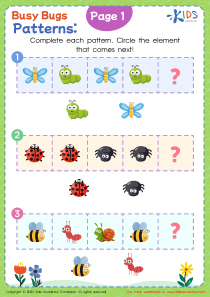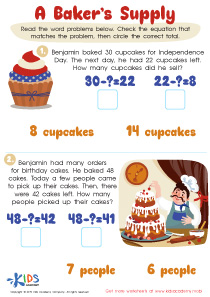Science Lessons | Relationships in ecosystems for 8-Year-Olds
4 results
Dive into the fascinating world of nature with our "Relationships in Ecosystems for 8-Year-Olds" lessons! Tailored specifically for young curious minds, this series unlocks the secrets of how living things interact within their habitats. Through engaging interactive worksheets, captivating educational videos, and fun assessment quizzes, children will explore the complex connections that make up ecosystems. They'll learn about the roles of predators and prey, the importance of plants, and how everything in nature is interconnected. Perfect for fostering a love for the environment, these lessons promise to make learning about ecosystems an exciting adventure for every 8-year-old!
In the fascinating world of nature, every organism plays a significant role, and understanding these roles can greatly enhance a child's appreciation and knowledge of the world around them. Our specially designed curriculum on "Relationships in Ecosystems for 8-Year-Olds" is an invaluable resource that makes learning about ecosystems both engaging and educational for young minds. Through a thoughtful combination of interactive worksheets, educational videos, and assessment quizzes, this program brings to life the intricate connections between different organisms in various ecosystems in a way that is accessible and enjoyable for children.
The importance of understanding ecosystems and their inhabitants' relationships cannot be overstated. It helps children comprehend the delicate balance of nature and the importance of every creature, big or small, in maintaining the health and well-being of our planet. Our lessons on "Relationships in Ecosystems for 8-Year-Olds" are crafted to instill a sense of curiosity and respect for the natural world, providing kids with a solid foundation in ecological principles that will benefit their academic journey and their perspective on environmental conservation.
Interactive worksheets are a cornerstone of our curriculum. These engaging tools are designed to cater to the learning styles of 8-year-olds, incorporating vibrant graphics, puzzles, and activities that make learning about ecosystems a hands-on experience. Children can explore topics such as food chains, the roles of producers, consumers, and decomposers, and the concept of habitats and biodiversity, all at their own pace. The interactive nature of these worksheets ensures that learning is not just a passive activity but an adventure that stimulates critical thinking and problem-solving skills.
In addition to interactive worksheets, educational videos serve as a dynamic complement to our curriculum. These videos bring the wonders of ecosystems to life right before the children's eyes, showcasing the beauty and complexity of relationships within various habitats. Narrated in language that is easy for 8-year-olds to understand, these videos make complex concepts accessible and memorable. Whether it's witnessing the symbiotic relationship between clownfish and anemones or understanding how plants convert sunlight into energy, these videos make every lesson vivid and engaging.
Assessment quizzes are also a key component of our "Relationships in Ecosystems for 8-Year-Olds" program. These quizzes provide a fun and interactive way for children to review what they've learned, helping to reinforce their understanding and retention of key concepts. By including immediate feedback, these quizzes also help children identify areas where they might need more practice, ensuring a comprehensive understanding of the material.
Our curriculum on "Relationships in Ecosystems for 8-Year-Olds" is more than just an educational tool; it's a gateway to fostering a lifelong appreciation for nature and its intricate web of life. By engaging children in a manner that is both fun and informative, we aim to cultivate environmentally conscious individuals who understand the importance of every relationship within ecosystems. This understanding is crucial not only for their academic success but also for their role as stewards of our planet's future.














